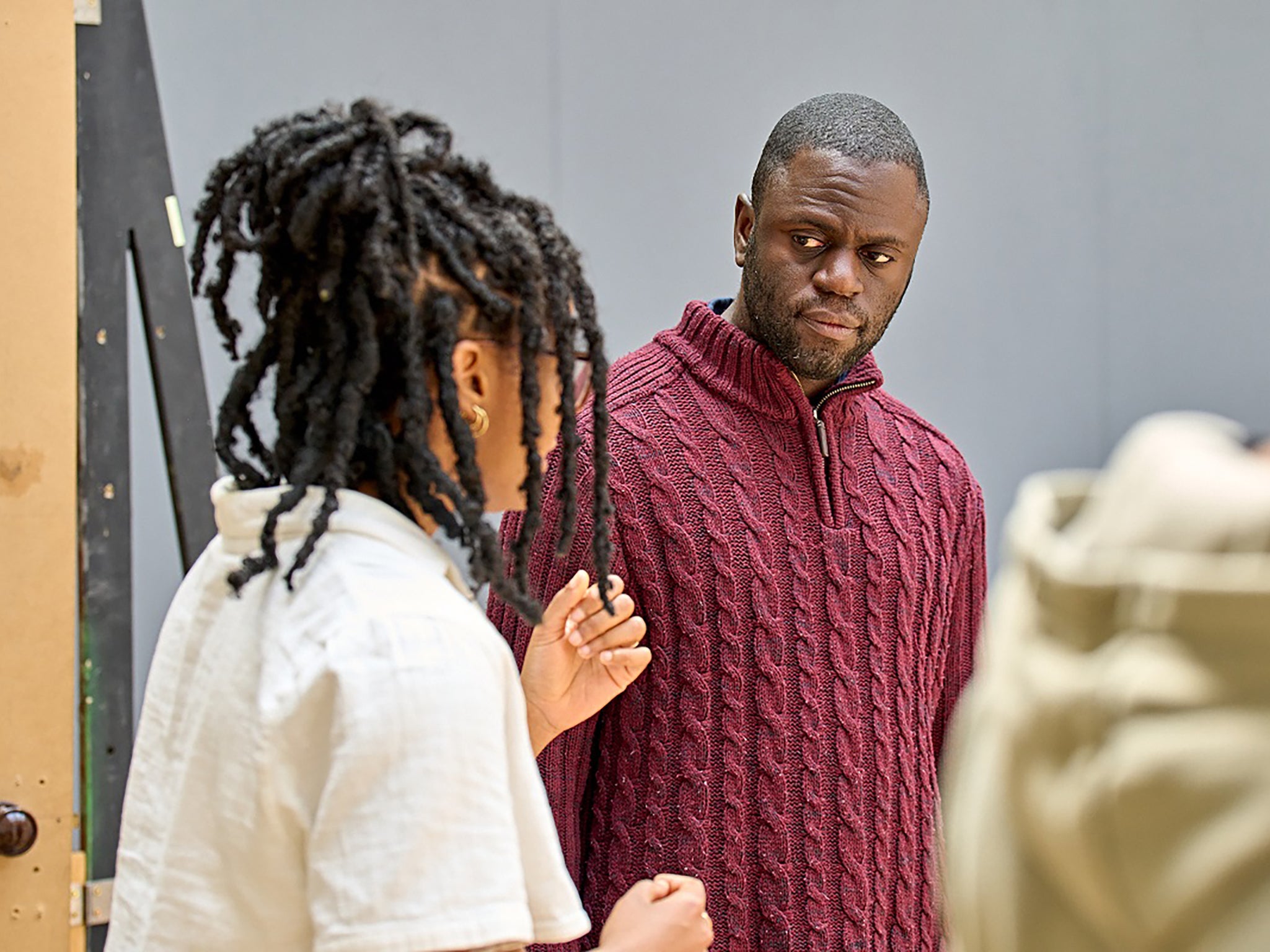
Tinuke Craig is an appalling actor. At least, that’s what she tells me of her brief experience on stage before she was installed safely in the director’s seat, calling the shots, where she always wanted to be. “When you’re a teenager, that’s kind of the only way you can get involved,” she laughs. “You can’t really walk into a room and be like, ‘I’m gonna direct this.’ But the main thing I took from being on the other side is just thinking, ‘Wow, I’m really terrible.’”
Thankfully, those days of South London Youth Theatre performances are far behind her. Since then, 34-year-old Craig has directed a wide range of stage productions around the UK, including the musical of The Color Purple (an adaptation based on Alice Walker’s book and the 1985 film, which is set to become a film in its own right), as well as Mike Bartlett’s Vassa (a comic update of Maxim Gorky’s 1910 original) and a pantomime version of Cinderella at Lyric Hammersmith.
This month, she prepares to make her Old Vic directorial debut with a production of August Wilson’s Olivier-award-winning Jitney, set in an unlicensed taxi-cab office in Pennsylvania. After a successful run at Leeds Playhouse last autumn, the play comes to London with much of the same cast and crew in tow.
We’re meeting a couple of weeks into the rehearsal period, in one of the London theatre’s spare offices. Despite it being one of the warmest days of the year so far, Craig’s drink of choice is a mug of hot water. Wearing pastel-coloured dungarees and her hair in locs, half tied back, she seems both relaxed and energised – pretty much the perfect state in which to lead a cast.
“It’s feeling really good so far,” she nods, taking a careful sip. “It’s nice coming back together as a team after Leeds. There are some scenes that feel like we all fall into the thing that we did before, and it feels like just putting a new layer on something we know. Then there are other bits where, for whatever reason, the alchemy is different, and actually we need to start again.”
Written in 1977, Jitney is the first play in Wilson’s 10-work series, The Pittsburgh Cycle. Each is set in a different decade of the 20th century, giving an insight into Black American lives over a time of change. Other works in the series include Ma Rainey’s Black Bottom and Fences, both of which have been adapted for the screen in recent years, exciting renewed interest in Wilson’s work.
As is the case with other pieces in Wilson’s catalogue, Jitney’s action takes place in one stationary location. In 1970s Pittsburgh, regulated cabs wouldn’t venture into Black neighbourhoods – so the community provided their own. Over the course of the play, the audience watches as the characters banter and bicker, sometimes opening up about the ways they’re struggling mentally and emotionally. That is, before duty calls them away for the next job.
The business faces a shaky future when the building that houses the taxi rank gets sold as part of the city’s development plan. “What’s happening to Pittsburgh in this period is, depending on your position, it’s being ‘regenerated’ or ‘gentrified and decimated’,” Craig explains. “These people who have lived there for their whole lives, who have built a community there out of necessity, because they don’t have access to other parts of the state, are suddenly being displaced in favour of more money and better commerce.”
For Craig, this is one of the aspects that make the play feel so relevant for a 2022 audience in London. “I mean, I’m from Brixton,” she continues. “So I know that feeling intimately; that sense of ‘Where the hell am I gonna go, and why doesn’t me needing a place to live matter in the name of money?’ There’s a kind of shadow of capitalism that just does not give a s*** about who’s trying to make a world for themselves, and how important community is – something we know, from the last two years, is really, really necessary.”
I felt like I kind of knew the characters a bit. They remind me of my uncles. They might’ve been my dad
Craig speaks fast, especially so when it comes to matters she cares about: her love for her hometown, as well as the beauty of Jitney’s language and its messages. She first came into contact with the play by chance as a 20-something-year-old English and drama student. With a few non-professional directorial credits under her belt, via the University of Sussex’s performing arts society, she was “not quite a director, but on my way there”.
At that point, being a director was a means to an end – in order to watch the shows she wanted, she had to put them on. “It wasn’t anything more sophisticated than that,” she says, shaking her head. “As it turned out, I really enjoyed it.” She went on to study at the London Academy of Music and Dramatic Art (Lamda) before winning the Young Vic’s Genesis Future Directors Award. She made her professional directing debut there with debbie tucker green’s play dirty butterfly in 2014.
But back in 2010, Craig saw that the Young Vic was staging another of Wilson’s plays, Joe Turner’s Come and Gone. The sight of a show exclusively featuring prominent Black actors such as Delroy Lindo and Adjoa Andoh captured Craig’s attention. “I’d seen a leaflet for it and thought it was cool,” she remembers. “And in that leaflet, they’d mentioned that there were 10 plays by this writer – and I happened to be in Book Mongers in Brixton, a second-hand bookshop not far away from where my mum lives, and I found it in the play section. I was like, ‘Oh, it’s that guy August Wilson again.’”
She wanted to know more. Upon reading it, she felt an instant affinity with its story and the roles it introduced. “I just really liked the characters, and I felt like I kind of knew them a bit,” she says. “They remind me of my uncles. They might’ve been my dad. It felt real. And I liked how much time and space the play gave these men just to talk about what the hell was going on in their lives. I find it to be really helpful and useful when you see Black men engage in that way, because they’re not always afforded those spaces in order to do so.”

Before we know it, it’s time for Craig to return to rehearsals – today, they’ve been working on a “big, galvanising, everybody-on-stage scene, then a two-hander”. But before she goes, I ask her who she hopes will come to see the play. Her answer comes quickly. “It almost sounds too glib and too reductive, but I want Black people to see it,” she shrugs. “I think August Wilson was writing for Black people. One of the things I really like about him is that often, with these 10 plays, it feels like a kind of alternative Black universe.”
For Craig, having a space that depicts Blackness in and of itself, not in relation to whiteness, feels important. “Whiteness turns up in these plays every now and then, but it’s never the centre. It’s never the point. It’s a world where you can sit with individual Black characters rather than it having to be about Blackness. Because everybody’s Black! It’s not an ‘issue’ play in that way.”
Still, it’s something that Craig thinks all audience members can enjoy and gain something from – whether they are regulars in the stalls or otherwise. “We had a lot of first-time theatregoers in Leeds, and it was so exciting to be able to go: ‘Whatever you thought plays were like, some of them are like that, but some of them are like this.’” Something different. “And I think that is so great,” she nods, taking a slight pause. “I hope if there are people who wouldn’t normally take that risk, they might feel like this is a play where I think the risk could pay off.”
‘Jitney’ runs at the Old Vic until 9 July







